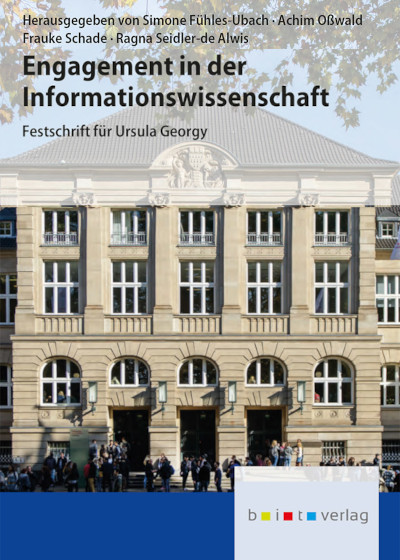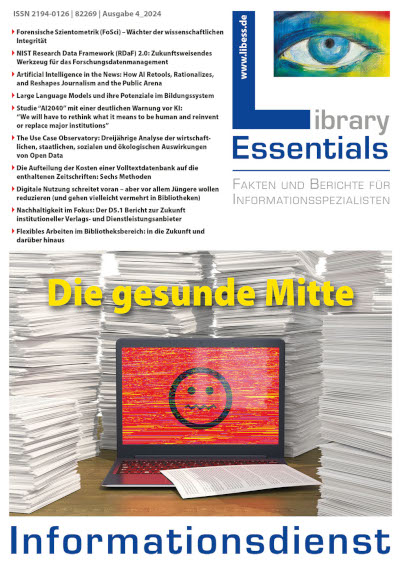 WEITERE NEWS
WEITERE NEWS
- Nomos eLibrary begrüßt Lehmanns Media als neuen Partner
- Ausstellungeröffnung in der Staatsbibliothek zu Berlin: „Droste Digital. Handschriften – Räume – Installationen“
- OCLC gewinnt Stadtbibliothek Essen als neuen BIBLIOTHECAnext Kunden
- Neue Wege zur Wunsch-Bibliothek
- Basisdienst nfdi.software gestartet
- Stifterverband-Ausschreibung: Hochschulen können sich für die Open-Science-Strategiewerkstatt bewerben
- Impulspapier zum Hochschul- und Wissenschaftssystem der Zukunft
- Die Bibliotheken des Jahres 2024 stehen fest!

Aktuelles aus
L
ibrary
Essentials
In der Ausgabe 4/2024
- Forensische Szientometrik (FoSci) – Wächter der wissenschaftlichen Integrität
- NIST Research Data Framework 2.0: Zukunftsweisendes Werkzeug für das Forschungsdatenmanagement
- Artificial Intelligence in the News:
How AI Retools , Rationalizes, and Reshapes Journalism and the Public Arena - Large Language Models und ihre Potenziale im Bildungssystem
- The Use Case Observatory:
Dreijährige Analyse der wirtschaftlichen, staatlichen, sozialen und ökologischen Auswirkungen von Open Data - Die Aufteilung der Kosten einer Volltextdatenbank auf die enthaltenen Zeitschriften: Sechs Methoden
- Flexibles Arbeiten im Bibliotheksbereich: in die Zukunft und darüber hinaus
- Die Zukunft der Wissenschaftlichen Monografien: Neue Geschäftsmodelle und der Einfluss der Politik

fachbuchjournal
Ausgabe 6 / 2023
BIOGRAFIEN
Vergessene Frauen werden sichtbar
FOTOGRAFIE
„In Lothars Bücherwelt walten magische Kräfte.“
Glamour Collection, Lothar Schirmer, Katalog einer Sammlung
WISSENSCHAFTSGESCHICHTE
Hingabe an die Sache des Wissens
MUSIK
Klaus Pringsheim aus Tokyo
Ein Wanderer zwischen den Welten
MAKE METAL SMALL AGAIN
20 Jahre Malmzeit
ASTRONOMIE
Sonne, Mond, Sterne
LANDESKUNDE
Vietnam – der aufsteigende Drache
MEDIZIN | FOTOGRAFIE
„Und ja, mein einziger Bezugspunkt
bin ich jetzt selbst“
RECHT
Stiftungsrecht und Steuerrecht I Verfassungsrecht I Medizinrecht I Strafprozessrecht
uvm




















































